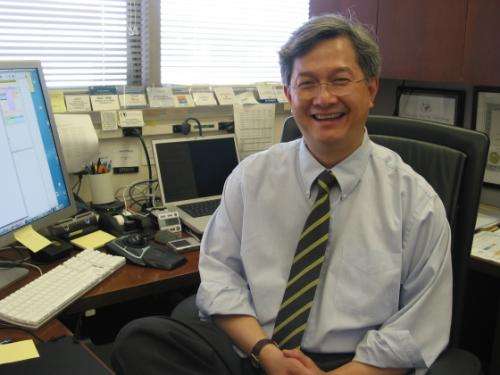Redefining dentistry through 'salivaomics'

(Medical Xpress)—Scientists from the UCLA School of Dentistry have been at the vanguard of research on human saliva in recent years, leading the way in the dynamic, emerging field of salivary diagnostics, which seeks to catalog the biological makeup of saliva to help screen for and detect both oral and systemic diseases.
Now, the Journal of the American Dental Association, a leading publication for dental professionals, has published a special supplement to its October issue in which Dr. David Wong, the school's associate dean of research, outlines the state of the science of salivary diagnostics, highlighting advances made by researchers at UCLA and other institutions and charting a path for future research and clinical applications.
In the article, Wong's research findings show that saliva is made up of complex sets of molecules—including genes, proteins, DNA and RNA—that help paint a picture of an individual's biology. The study of the biological molecules in saliva is known as "salivaomics." Findings show that by studying the "omics" in saliva—such as genomics, transcriptomics and proteomics—scientists can develop tests composed of many molecular measurements; the findings are then interpreted by a computational model to produce a clinically actionable result.
Through collaborative work with scientists at other institutions, UCLA researchers have developed several informatics and statistical tools to help interpret biomarkers in saliva; these biomarkers can then be used for early detection of disease, treatment monitoring, recurrence prediction and other translational assessments.
Research done at the UCLA School of Dentistry has shown that saliva, as a medium for health screening is just as useful as blood and other bodily fluids and has vast potential for the early detection of cancers, autoimmune diseases, diabetes and other disorders.
The ability to conveniently and inexpensively capture saliva samples in a clinical setting for diagnostic purposes would be a huge step forward for health care providers in the detection, treatment and prediction of recurrence of life-threatening diseases. Wong expects that future research in salivaomics will eventually translate into practical medical applications that will be administered in dentists' and doctors' offices.
And because it has been shown that 20 percent more Americans visit their dentists more regularly than their physicians, there will be substantial opportunities for dentists to engage in primary health care by taking saliva samples from their patients and, based on the medical findings of those samples, developing individualized treatment plans.
More information: jada.ada.org/content/143/10_suppl/19S.full















